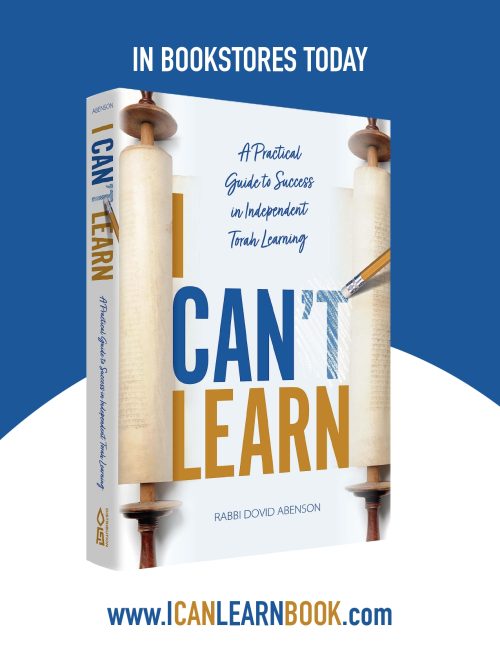Since the launch of my recent book “I CAN LEARN”, people have reached out to me expressing their appreciation of my addressing “their story” in the book. Unfortunately, there are a growing number of “their stories” and I would like to share a few recent ones below.
15-year-old Chaim’s parents stumbled across my book in a seforim store (see previous article “ I CAN Learn….and So Can You!”). While scheduling an evaluation for Chaim, his mother noted he was on medication for ADHD. She had recalled reading in my book that I advise coming off such medications for 24 to 48 hours before the evaluation session. This is to assess the baseline abilities without the “help” of medication. So we pushed off the initial evaluation for a few days to allow for this. During the evaluation, Chaim showed the familiar encounter I see with struggling clients, interchangeable letters, displaying slow letter recognition, reading in syllables (not whole words), and not knowing the “shvah” rules. Because of these reading challenges, his vocabulary was very poor and he also had a hard time reading Rashi.
I pointed out to his mother that lacking these crucial foundation skills would create chaos in Chaim’s head and lead to not being able to focus in class. Since it had been the school that advocated for Chaim to take medication for focusing in the first place, she was shocked that the school had taken this route to press medication on her son, rather than identifying any underdeveloped skills that needed to be addressed.
This is the growing trend in many schools, particularly in cities that have a dense population of frum Yidden. A mechanech told me that in his community alone, at least 30% of students are being medicated. This dangerous and concerning practice offers a quick fix to behavioral problems but does not address the root causes.
24-year-old Shaya is studying in Eretz Yisroel. He noticed my book in the bookstore in Geula and purchased it out of curiosity. He was surprised to read about the difficulties in learning faced by so many, and that there were real tools available to fix these issues. Since he was in the States over the summer, he contacted me. Shaya described how he had always thought he just didn’t have the brains for learning. He was encouraged to read that learning problems are usually the result of a lack of skills, which can be taught and improved. He related so much to the stories in the book and thought perhaps there was hope for him too, hence his call.
Shaya had learned his whole life in very standard yeshivos in the US and Eretz Yisroel. The evaluation revealed several specific weaknesses. He was thrilled that I was able to pinpoint them with such accuracy. No one in his yeshivos had noticed them till now. He is very happy to continue the program.
Pinchas, age 31 years old who was learning until recently, was browsing in the bookstore one day when my book caught his eye. He read it and was delighted that for the first time in his life, questions that always bothered him about learning were addressed. He set up an appointment for an evaluation. The assessment revealed a particular weakness in Rashi’s reading.
During the first remediation, I went through a basic crash course in Hebrew grammar. When it came to the “vov hahepuch” he had no idea what it meant and it had always bothered him. Unfortunately in most Yeshivos, students are not trained to focus on exact translation. For intelligent students like Pinchas, this can be particularly bothersome. The brain is working hard to figure everything out but the vague translations create more questions than they answer. Pinchas also got mixed up between Modern Hebrew (Ivrit) and Lashon Hakodesh (see the appendix in the book on the dangers of teaching Torah in Hebrew). For the first time in his life, he realized that he really could learn he just didn’t have his foundation skills fully developed. Perhaps his dreams of becoming a rebbi could at last be realized.
A 56-year-old Baal Teshuva student of mine was instrumental in helping me in the process of publishing this book. He was very impressed by the final product and recommended it to a Shabbos guest, a baal teshuva in his 40s, we’ll call him Shlomo. Shlomo was excited by the book and considered trying the program. He insisted though, that an evaluation was unnecessary as “he does not know anything” in Torah learning. Shlomo was excited to begin and committed to doing the work involved. After two more sessions he was able to read Hebrew! Hebrew grammar starts next week iyH.
On Friday I received a phone call. The caller told me that he had been in a Judaica bookstore and noticed several new books piled on a display table. “Your book’s pile was the lowest so I assumed It must be a good seller and promptly bought it…. I couldn’t believe it. I was glued to it. I couldn’t put the book down…I wanted to call you right away but it took me a few days to pluck up the courage”.
Although the caller had been to all the best yeshivas in Israel and America and had been a shoel umeshiv (over 40 years old) for over a decade, he had always lacked clarity in his learning. “I want to learn with you for 5 years so please give me the skills so I can help others, especially now that I’m becoming a rebbe.” Because of a good understanding of the text outside, and a lack of emphasis on textual skills, he understood Chumash well. However, he lacked total accuracy, such as translating plural words as singular and vice versa, yet still getting the gist. We went over the passages in Chumash slowly a few more times until he started to see the errors himself.
The next session I asked him to translate: הֶאֱכַלְתִּי and הֶאָכַלְתִּי. He replied: “I eat. I eat”. I asked if there was any difference in the words. He noted that the vowel under the alef is different but he could not explain what difference it made to the meaning of the words. There is a big difference between both of those words הֶאָכַלְתִּי meaning “Did I eat?” הֶאֱכַלְתִּי is causative “I fed”.
By teaching mostly outside the text many rebbeim compensate for poor grammar and translation skills. But this simply transmits inaccuracy to the next generation of talmidim. Fortunately, he is among the courageous few teachers willing to learn and improve their skills to teach their students more clearly. How many more rebbeim could do with an upgrade in this area?
Rabbi K. has been a rebbi for 18 years. He called me early one morning from New York. “Rabbi Abenson, I’m so happy that you had the guts to write such an important, well-written book on education.” He told me that he knew there were problems in the yeshiva system but could not identify what they were. He was happy to see them crystallized, with a clear approach to rectifying them. “Everyone should have this book”. He claimed.
The commonality of the above stories all highlight the cracks we are witnessing in our mesorah in teaching the Torah.
As a highly respected mechanech told me this week, 70% of bochurim leave yeshiva without knowing anything.
It is for this reason that I wrote this book.
Never give up on your Torah learning. It makes no difference how old you are!!
https://www.icanlearnbook.com/
———————–
For evaluations, speaking engagements or to sponsor my seforim, please contact my office at Tel. (514) 739-3629
Cell/Whatsapp (514) 993-5300
Email: [email protected]
Rabbi Abenson is the founder and director of ShaarHatalmud, a unique yeshivah-based online program, which incorporates learning all Kodesh subjects, from Kriah up to learning Gemara, Rishonim, and Shulchan Aruch. He also conducts evaluations, remediation, and training, and consults with school principals to improve students’ underdeveloped skills.


